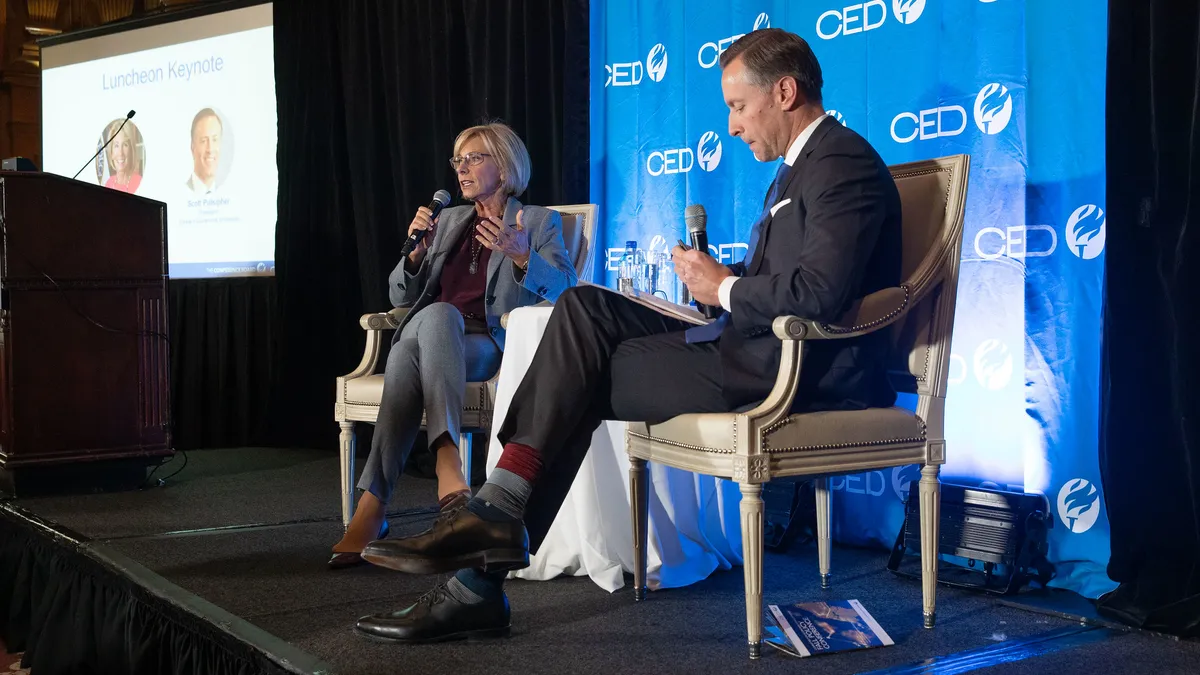WASHINGTON, D.C. — U.S. Education Secretary Betsy DeVos on Wednesday extolled the potential benefits of microcredentials and other alternatives to traditional degrees, calling on the higher education sector to innovate and look to inexpensive programs for college students.
Speaking to corporate leaders at an event run by the Committee for Economic Development of The Conference Board, a public policy and economic think tank, DeVos touted the department's moves to give more flexibility to institutions by loosening federal policies on accreditation and federal student aid.
The session was moderated by Scott Pulsipher, president of the nonprofit online giant Western Governors University. The Ed Department reversed a hefty fine levied against Western Governors earlier this year after the Office of Inspector General (OIG), the agency's internal watchdog, found in an audit that it had not met certain federal requirements for online programs. The OIG said the university would have to pay back $713 million in Title IV funding, but the department declined to enforce the recommendation, and OIG signed off on the decision.
DeVos complimented Pulsipher and the direction of Western Governors, which has pushed microcredentials, particularly for working adults. As substitutes for or complements to four-year degrees, they have drawn praise for being less expensive than a bachelor's degree, though data on such programs is sparse and their transferability among institutions is limited.
Colleges and universities have invested in pricey programs and brick-and-mortar facilities, which have added to their expenses and not recognized the changing landscape of academe, DeVos contended, repeating a commonly cited statistic that more than 80% of jobs that will be offered a decade from now do not yet exist (this figure has been widely questioned). And Pulsipher pointed out that students outside the typical age range of 18 to 22 often do not care about flashy perks at colleges — they merely want to get a degree.
Too long have high school students been pressed to attend a traditional four-year college while jobs that don't require a bachelor's degree go unfilled, DeVos said, though she did not provide examples. Federal data shows that about 67% of high school graduates in 2017 enrolled in a two- or four-year institution right after graduation.
"We've had a singular focus in the last number of decades on preparing to go to college, a traditional four-year college at the expense of other alternatives and other options," DeVos told the crowd.
Individuals with bachelor's degrees have double the median lifetime earnings compared to high school graduates, according to statistics cited in a 2017 report from Brookings. But students who have less than a bachelor's degree but more than a high school diploma account for 24% of jobs that pay at least $35,000 for younger workers and $45,000 for older workers, according to recent research from Georgetown University's Center on Education and the Workforce. (Bachelor degree-holders accounted for 56% of such jobs.)
DeVos repeated — in broad terms, with little specifics — that "choice" was the way to boost the profile of American education. She mentioned the Ed Department's actions around accreditation. The department unveiled its final regulations on accreditation last month that eliminated geographic boundaries for accreditors and eased the process for colleges to receive approvals or make institutional changes to their programs. Critics of these rules said they removed key oversight of underperforming institutions.
The department also introduced a pilot program this year that would remove limits on the portion of work-study funds that flows to the private sector.
"Figure out how you can partner to meet the needs of students today and for your workforce today and tomorrow," DeVos said. "We have a way too big of a wall between education and business and industry, and those walls have got to come down."














